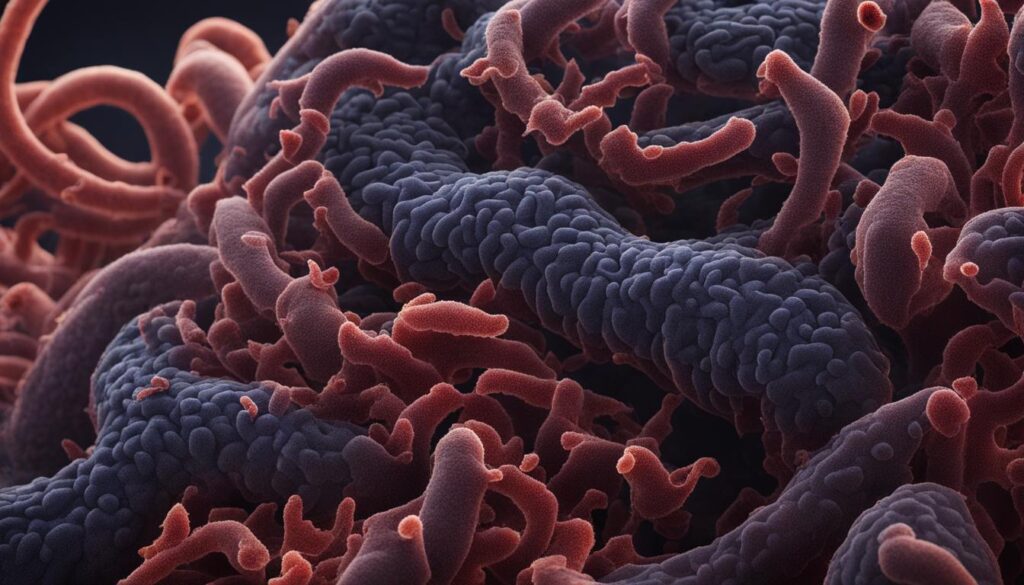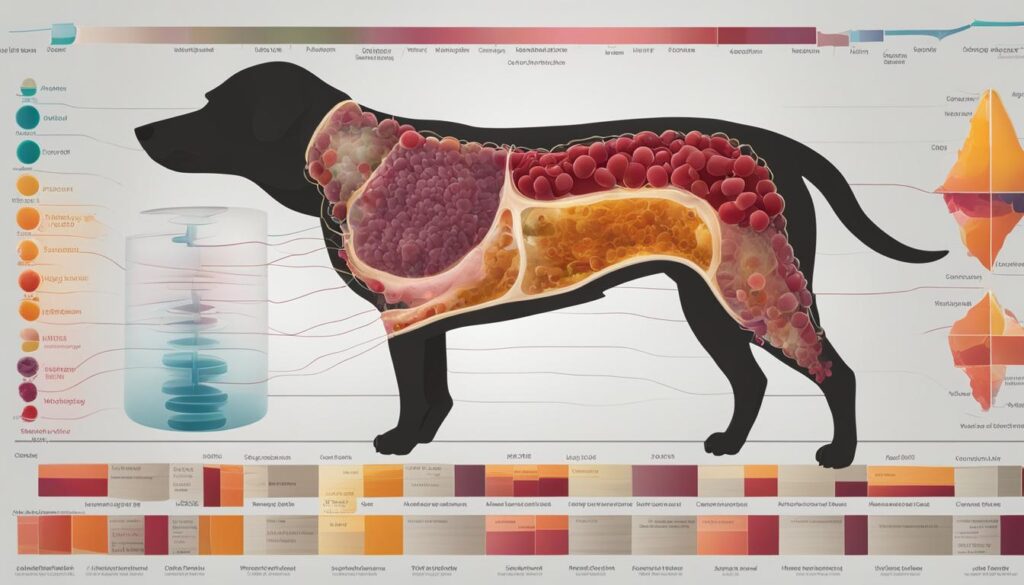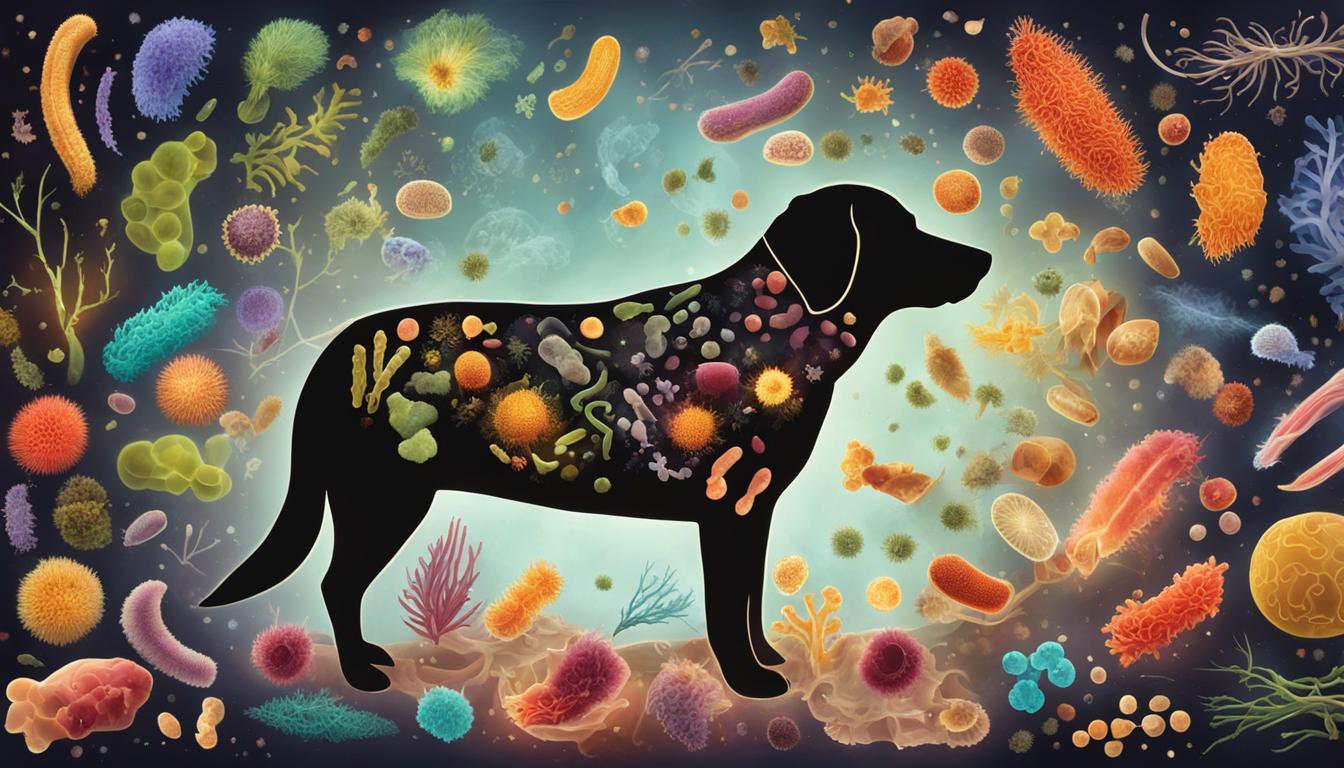Welcome to the fascinating world of the canine gut microbiota! Did you know that the trillions of microorganisms residing in your furry friend’s gastrointestinal tract play a vital role in their overall health and well-being? It’s true! The gut microbiota, which includes bacteria, archaea, viruses, and eukaryotic organisms, has a profound impact on various aspects of your dog’s life, from their metabolism to their immune system.
The gut-brain axis is a fascinating connection between the gut microbiota and your dog’s brain. The production of serotonin, a neurotransmitter responsible for mood regulation, is primarily carried out in the intestine. This highlights just how crucial a healthy and stable gut microbiome is for your canine companion.
But what factors influence the composition of your dog’s gut microbiota? Diet is a major player. The type and content of food your dog consumes can shape their gut microbiome. Additionally, probiotics and prebiotics can also have a positive impact on your dog’s gut health.
In this article, we will delve into the details of the canine gut microbiota, exploring its influential role in your dog’s health. So, get ready to learn more about how you can support your furry friend’s well-being from the inside out!
Key Takeaways:
- The gut microbiota plays a crucial role in your dog’s health and well-being.
- The gut-brain axis connects the gut microbiota to your dog’s brain.
- Diet and the consumption of probiotics and prebiotics influence your dog’s gut microbiota.
- A healthy and stable gut microbiome is essential for your dog’s overall wellness.
- Stay tuned to discover more about enhancing your dog’s digestive health!
Factors Influencing Gut Microbiota in Dogs
When it comes to the gut microbiota in dogs, several factors can have a significant impact on its composition and diversity. One of the most influential factors is the dog’s diet. The food they consume plays a crucial role in shaping their gut microbiome. Different macronutrient contents can lead to changes in bacterial composition, highlighting the impact of diet on the dog’s gut microbiota. To promote a healthy gut flora, it’s essential to consider the impact of diet and ensure a balanced and nutritious meal for your furry friend.
In addition to diet, probiotics and prebiotics are known to influence the gut microbiota and promote gut health in dogs. Probiotics are beneficial live microorganisms that can be administered to support a healthy gut microbiota. They help restore the natural balance of bacteria in the gut. Prebiotics, on the other hand, are non-digestible compounds that serve as a food source for beneficial bacteria in the gut. Including probiotics and prebiotics in your dog’s diet can help support a healthy gut flora and overall digestive well-being.
The gut microbiota in dogs also varies along the gastrointestinal (GI) tract, with different bacterial abundance and richness in different segments. The small intestine has a mixture of aerobic and facultative anaerobic bacteria, while the colon is mainly colonized by anaerobes. Understanding the microbial distribution along the GI tract can provide valuable insights into the digestion and absorption of nutrients in dogs. It also emphasizes the importance of maintaining a healthy balance of bacteria throughout the entire digestive system.
The Impact of Diet on Gut Microbiome Diversity
To further illustrate the impact of diet on the gut microbiome of dogs, let’s take a closer look at a comparative table showcasing the effects of different feeding regimens:
| Diet Type | Gut Microbiome Composition |
|---|---|
| Commercially Processed Kibble | Decreased microbial diversity, lower abundance of beneficial bacteria |
| Raw Food Diet | Increased microbial diversity, higher abundance of beneficial bacteria |
| High-Fiber Diet | Increased abundance of fiber-digesting bacteria, improved gut health |
As shown in the table above, commercially processed kibble diets tend to have a negative impact on the diversity and abundance of beneficial bacteria in the gut microbiome. On the other hand, raw food diets and high-fiber diets promote a more diverse and balanced gut microbiota, leading to improved overall gut health in dogs. It’s important to choose a diet that supports a healthy gut microbiota to ensure your furry friend’s well-being.
“A healthy gut microbiota is essential for your dog’s overall health and well-being. By understanding the factors that influence gut microbiota composition, such as diet and the use of probiotics and prebiotics, you can make informed choices to support your dog’s digestive health.”
Healthy Gut Microbiota in Dogs
The composition of the gut microbiota in dogs may vary between studies, but it is consistently co-dominated by three phyla: Fusobacterium, Bacteroidetes, and Firmicutes. These phyla are prevalent in the fecal microbiome of healthy dogs, along with bacterial classes such as Clostridia, Bacilli, and Erysipelotrichi. Some genera, like Prevotella and Bacteroides in the Bacteroidetes phylum, show variations in abundance between dogs. Fusobacterium, in particular, plays a crucial role in maintaining a healthy gut microbiota in dogs.
Despite its association with Fusobacterium in humans, the presence of Fusobacterium in the canine gastrointestinal (GI) tract is associated with a different role. In dogs, it is considered a beneficial bacterium that contributes to a healthy gut microbiota. Other phyla commonly identified in the gut microbiota of dogs include Proteobacteria and Actinobacteria. These findings provide insights into the core fecal bacterial community in dogs and its importance for canine gut health and overall well-being.
Understanding the composition of a healthy gut microbiota in dogs is essential for identifying potential imbalances or dysbiosis that may lead to disease. By studying the fecal microbiome and the prevalence of specific phyla and genera, researchers can gain insights into how the gut microbiota affects canine health and explore ways to enhance digestive health through interventions like probiotics, prebiotics, and dietary modifications.
Carnivorous Diet and Dog’s Gut Microbiome
A dog’s gut microbiome is greatly influenced by its diet, and a carnivorous diet has a significant impact on the composition and function of the gut microbiota. As natural carnivores, dogs have evolved to thrive on a meat-based diet, which provides the essential nutrients and enzymes they need for optimal digestion and gut health. The carnivorous diet for dogs typically consists of high-quality animal proteins, fats, and minimal carbohydrates.
Research has shown that a carnivorous diet promotes a balanced and diverse gut microbiota in dogs. The abundance of animal proteins in the diet supports the growth of beneficial bacteria, such as Prevotella and Fusobacterium, which play a crucial role in maintaining gut health. These bacteria help break down proteins and produce short-chain fatty acids, which provide energy and support the integrity of the intestinal lining.
Compared to a plant-based diet, a carnivorous diet for dogs may lead to a lower abundance of fiber-degrading bacteria in the gut. However, dogs have a shorter digestive tract and a faster transit time compared to herbivores, making it less necessary for them to rely heavily on fiber for their digestive processes. While vegetable fiber can still have some benefits for the gut microbiota in dogs, it is not as essential as it is for herbivorous animals.

Table: Dysbiosis and Disease Associations
| Disease | Associated Dysbiosis |
|---|---|
| Inflammatory Bowel Disease (IBD) | Altered diversity and abundance of bacterial clusters |
| Obesity | Shifts in the microbial community structure |
| Allergy | Imbalance in gut microbiota composition |
| Diabetes | Disruptions in the gut microbial balance |
| Mood Disorders | Changes in the gut-brain axis communication |
Understanding the relationship between dysbiosis and disease in dogs opens up possibilities for novel interventions. Manipulation of the gastrointestinal microbiome through interventions like prebiotics, probiotics, and fecal microbiota transplantation (FMT) has shown promise in restoring the microbial balance and improving disease outcomes. Ongoing research in the field of gut microbiota and its impact on canine health continues to provide valuable insights into potential treatments and strategies for enhancing digestive health in dogs.
Manipulating the Gut Microbiome

When it comes to promoting gut health in dogs, manipulating the gut microbiome has emerged as a promising approach. Various interventions, including the use of probiotics, prebiotics, and fecal microbiota transplantation (FMT), offer potential benefits in restoring a healthy microbial balance and treating certain disease conditions.
Probiotics are live microorganisms that can be administered as supplements or incorporated into food to promote a healthy gut microbiota. These beneficial bacteria help improve digestion, strengthen the immune system, and maintain a balanced microbial ecosystem. Probiotic strains such as Lactobacillus and Bifidobacterium have shown positive effects in enhancing gut health in dogs.
Prebiotics, on the other hand, are non-digestible compounds that serve as a food source for beneficial bacteria in the gut. They help stimulate the growth and activity of these beneficial bacteria, promoting a healthy gut microbiome. Examples of prebiotics commonly used in canine nutrition include fructooligosaccharides (FOS) and inulin.
“The use of probiotics, prebiotics, and fecal microbiota transplantation (FMT) has shown promise in altering the gut microbiota composition and improving various disease conditions in dogs.”
Fecal microbiota transplantation (FMT) involves transferring fecal material from a healthy donor to a recipient to restore a healthy microbial balance. This procedure has been successfully used in dogs with conditions such as recurrent diarrhea, antibiotic-associated diarrhea, and inflammatory bowel disease. FMT helps replenish beneficial bacteria and restore the diversity of the gut microbiota, leading to improved gut health.
Benefits of Gut-Microbiome Manipulation
By manipulating the gut microbiome, pet owners and veterinarians can potentially unlock a range of benefits for dogs. Some key advantages include:
- Promoting digestive health and improving nutrient absorption
- Enhancing immune function and reducing the risk of infections
- Managing and preventing gastrointestinal disorders
- Supporting overall well-being and quality of life
While further research is still needed to fully understand the optimal strategies for manipulating the gut microbiome in dogs, the potential for using probiotics, prebiotics, and FMT holds significant promise in improving canine gut health and addressing various disease conditions.
| Intervention | Purpose | Examples |
|---|---|---|
| Probiotics | Introduce beneficial bacteria to the gut | Lactobacillus, Bifidobacterium |
| Prebiotics | Support the growth of beneficial bacteria | Fructooligosaccharides (FOS), inulin |
| Fecal Microbiota Transplantation (FMT) | Restore a healthy microbial balance | Fecal material from a healthy donor |
Gut Microbiota Development in Dogs
The development of the gut microbiota in dogs is a fascinating process that begins at a young age and undergoes significant changes during the neonatal and early pediatric stages. Maternal transmission of microbiota plays a crucial role in populating the gut of newborn puppies, shaping their microbiome composition and diversity. Puppies are exposed to their mother’s microbiota during birth and through nursing, which kickstarts the colonization of their own gut microbiome. This early microbiota development is essential for the establishment of a healthy immune system and proper gut structure in puppies.
Various factors can influence the development of the gut microbiota in puppies. The mode of delivery, whether natural birth or cesarean section, can impact the initial colonization of the puppy’s gut. Studies have shown that vaginally delivered puppies have a higher abundance of beneficial bacteria, such as Bifidobacterium, compared to those born via cesarean section. Diet also plays a significant role, as puppies transition from milk to solid food. The introduction of solid food exposes puppies to new bacteria and helps shape their gut microbiome. Additionally, environmental factors, such as exposure to other animals, humans, and different environments, can contribute to the diversification of the gut microbiota in puppies.
Understanding the development of the gut microbiota in dogs is crucial for promoting optimal health and wellbeing. By ensuring proper maternal care, providing appropriate nutrition, and creating a favorable environment, pet owners can support the healthy development of their puppies’ gut microbiome. Further research is needed to explore the specific mechanisms behind gut microbiota development in dogs and its long-term impact on their overall health. By unraveling these mysteries, we can continue to enhance our understanding of gut microbiota development in dogs and its importance for their lifelong wellness.

| Factors Influencing Gut Microbiota Development in Dogs | Description |
|---|---|
| Maternal Transmission | During birth and nursing, puppies are exposed to their mother’s microbiota, which plays a vital role in populating their gut with beneficial bacteria. |
| Mode of Delivery | The method of delivery, whether natural or cesarean section, can impact the initial colonization of the puppy’s gut, with vaginally delivered puppies having a higher abundance of beneficial bacteria. |
| Diet | The transition from milk to solid food exposes puppies to new bacteria and helps shape their gut microbiome. |
| Environmental Factors | Exposure to other animals, humans, and different environments can contribute to the diversification of the gut microbiota in puppies. |
Conclusion
The gut microbiota plays a crucial role in your dog’s overall health and well-being. It contributes to various physiological functions, protects against pathogens, and influences the immune system. By understanding the role of gut microbiota in dog health, researchers are constantly working to enhance canine digestive health.
Studies have shown that diet composition, probiotics, prebiotics, and other interventions can modulate the gut microbiota and promote gut health in dogs. These interventions help maintain a balanced microbial ecosystem, preventing dysbiosis and associated diseases.
Research in the gut microbiome of canines is expanding rapidly, providing insights into how it impacts canine health. This ongoing research offers potential avenues for improving digestive health and overall wellness in dogs. By staying informed and implementing appropriate measures, you can ensure that your furry companion’s gut microbiota thrives, keeping them healthy and happy.
FAQ
What is the gut microbiome in dogs?
The gut microbiome in dogs comprises bacteria, archaea, viruses, and eukaryotic organisms in the gastrointestinal tract.
What role does the gut microbiome play in a dog’s health?
The gut microbiome contributes to metabolic functions, protects against pathogens, educates the immune system, and affects various physiological functions in dogs.
How does diet composition influence the gut microbiome in dogs?
Studies have shown that different macronutrient contents can lead to changes in bacterial composition in the gut microbiome of dogs.
What are probiotics and prebiotics, and how do they affect the gut microbiota?
Probiotics are beneficial live microorganisms that can be administered to promote a healthy gut microbiota, while prebiotics are non-digestible compounds that serve as a food source for beneficial bacteria in the gut.
What is dysbiosis, and how is it associated with diseases in dogs?
Dysbiosis refers to an imbalance in bacterial composition and metabolic activity within the gut microbiota. It has been associated with conditions such as inflammatory bowel disease, obesity, allergy, diabetes, and mood disorders in dogs.
How can the gut microbiota be manipulated to improve canine health?
Therapies such as probiotics, prebiotics, and fecal microbiota transplantation (FMT) have shown promise in altering the gut microbiota composition and improving disease outcomes in dogs.
How does the development of the gut microbiota in dogs occur?
The gut microbiota in dogs starts developing at a young age and undergoes significant changes during neonatal and early pediatric stages. Factors such as maternal transmission, delivery mode, diet, and environmental exposure can influence its development.
What is the significance of the gut microbiota in overall canine health?
The gut microbiota plays a crucial role in various physiological functions, protecting against pathogens, and influencing the immune system, thus impacting the overall health and well-being of dogs.





